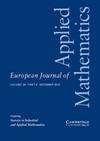A nonconservative kinetic framework under the action of an external force field: Theoretical results with application inspired to ecology
IF 1.1
4区 数学
Q1 MATHEMATICS, APPLIED
引用次数: 0
Abstract
The present paper deals with the kinetic-theoretic description of the evolution of systems consisting of many particles interacting not only with each other but also with the external world, so that the equation governing their evolution contains an additional term representing such interaction, called the ‘forcing term’. Firstly, the interactions between pairs of particles are both conservative and nonconservative; the latter represents, among others, birth/death rates. The ‘forcing term’ does not express a ‘classical’ force exerted by the external world on the particles, but a more general influence on the effects of mutual interactions of particles, for instance, climate changes, that increase or decrease the different agricultural productions at different times, thus altering the economic relationships between different subsystems, that in turn can be also perturbed by stock market fluctuations, sudden wars, periodic epidemics, and so on. Thus, the interest towards these problems moves the mathematical analysis of the effects of different kinds of forcing terms on solutions to equations governing the collective (that is statistical) behaviour of such nonconservative many-particle systems. In the present paper, we offer a study of the basic mathematical properties of such solutions, along with some numerical simulations to show the effects of forcing terms for a classical prey–predator model in ecology.外力场作用下的非保守动力学框架:启发生态学应用的理论结果
本文对由许多粒子组成的系统的演化进行了动力学理论描述,这些粒子不仅相互作用,而且与外部世界相互作用,因此控制它们演化的方程包含一个表示这种相互作用的附加项,称为“强迫项”。首先,粒子对之间的相互作用是守恒的和非守恒的;后者代表出生率/死亡率等。“强迫项”并不表示外部世界对粒子施加的“经典”力,而是对粒子相互作用的影响的更普遍的影响,例如气候变化,它在不同的时间增加或减少了不同的农业生产,从而改变了不同子系统之间的经济关系,这反过来也可能受到股市波动、突然的战争、周期性流行病等的干扰。因此,对这些问题的兴趣推动了对不同类型的强迫项对控制这种非守恒多粒子系统的集体(即统计)行为的方程解的影响的数学分析。在本文中,我们对这些解的基本数学性质进行了研究,并进行了一些数值模拟,以显示强迫项对生态学中经典捕食模型的影响。
本文章由计算机程序翻译,如有差异,请以英文原文为准。
求助全文
约1分钟内获得全文
求助全文
来源期刊
CiteScore
4.70
自引率
0.00%
发文量
31
审稿时长
>12 weeks
期刊介绍:
Since 2008 EJAM surveys have been expanded to cover Applied and Industrial Mathematics. Coverage of the journal has been strengthened in probabilistic applications, while still focusing on those areas of applied mathematics inspired by real-world applications, and at the same time fostering the development of theoretical methods with a broad range of applicability. Survey papers contain reviews of emerging areas of mathematics, either in core areas or with relevance to users in industry and other disciplines. Research papers may be in any area of applied mathematics, with special emphasis on new mathematical ideas, relevant to modelling and analysis in modern science and technology, and the development of interesting mathematical methods of wide applicability.

 求助内容:
求助内容: 应助结果提醒方式:
应助结果提醒方式:


